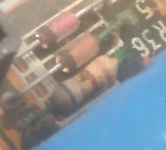What does it hurt to do so? Why take a chance? If the OP is willing to pay someone to do a recap I see nothing wrong with his doing so. Especially given the alternative.I agree with this. There are known bad brands/series/applications where recaps should always be done. But trying to say that all old caps should be replaced simply due to age is foolish.
Upcoming Events:
- VCF South West - June 14 - 16, Davidson-Gundy Alumni Center at University of Texas at Dallas
- VCF West - Aug 2 - 3, Computer History Museum, Mountain View, CA
- VCF Midwest - Sept 7 - 8 2024, Schaumburg, IL
- VCF SoCal - Mid February 2025, Location TBD, Southern CA
- VCF East - April 2025, Infoage Museum, Wall NJ
-
Please review our updated Terms and Rules here
You are using an out of date browser. It may not display this or other websites correctly.
You should upgrade or use an alternative browser.
You should upgrade or use an alternative browser.
Preserving 386 PC long term
- Thread starter mechaniputer
- Start date
jscipione
Experienced Member
You could replace all the electrolytic caps with ceramic ones. I have a 486 machine here that has no electrolytic capacitors on it, except for in the power supply… which just blew.
Replacing two leg, through hole components carries almost no risk (barring some special circumstance). Anyone with basic soldering skills, especially a service that specializes in racpping, shouldn't have any issues.I'd say you risk damaging something else while removing and replace ALL caps. You really only want to repair those you know are bad.
The same can be said by not doing a repair. In the end replacing two lead, through hole electrolytic capacitors involves almost no risk. Assuming you know what you're doing which I would hope a recapping service would.You always risk damage when you do a repair. It's just part of the job. Low chance Yes. But always there. It's up to you if the chances are acceptable or not.
Chuck(G)
25k Member
A question for the OP: Exactly how long do you expect to live? When you've shed the mortal coil and reside in a subterranean box, I'll wager that maintaining a working 386 will be of the least concern to you. That being said, 50 years is not unreasonable for a minimally-modified PC. Just take the damned batteries out!
Really? Who is going to send a PC to a place that re-caps? Unless it's very rare or for some other reason I doubt most would do so. You'd really have to love that system as i can't imagine the cost vs benefit. But do what you want I won't stop you. Unless something explodes then doing no repair will cause no damage unless the damage is already done.The same can be said by not doing a repair. In the end replacing two lead, through hole electrolytic capacitors involves almost no risk. Assuming you know what you're doing which I would hope a recapping service would.
modem7
10k Member
Comment for everyone:You could replace all the electrolytic caps with ceramic ones.
I look at the article at [here], one about high-capacity ceramic capacitors, and think to myself, "If I use a 10µF/50V ceramic capacitor on the 5V rail of my motherboard, is that capacitor only going to provide say, 2µF (bum pluck) worth of capacitance?"
Chuck(G)
25k Member
If your application can tolerate somewhat higher leakage, consider a solid-polymer aluminum electrolytic. Low ESR and very long life--and quite a bit more expensive.
maxtherabbit
Veteran Member
replacing functional parts is not a repair, it's OCDThe same can be said by not doing a repair. In the end replacing two lead, through hole electrolytic capacitors involves almost no risk. Assuming you know what you're doing which I would hope a recapping service would.
keenerb
Veteran Member
If you're really worried about the PSU going out and frying motherboard (which happened to me on a 486 VLB motherboard) that old 386 might be able to run off a PicoPSU + ATX to AT adapter. think the largest picopsu can provide up to 10 amps on 5v rail.
The chances that you ruin the system by recapping or having it recapped is much higher than the chance it dies from capacitor leakage over the next ten or fifteen years in my opinion. Also, aren't those almost all tantalum capacitors anyway? They don't really have leaking issues, they just explode and smell terrible and scare the shit out of you and then you replace them.
The chances that you ruin the system by recapping or having it recapped is much higher than the chance it dies from capacitor leakage over the next ten or fifteen years in my opinion. Also, aren't those almost all tantalum capacitors anyway? They don't really have leaking issues, they just explode and smell terrible and scare the shit out of you and then you replace them.
Really? Who is going to send a PC to a place that re-caps? Unless it's very rare or for some other reason I doubt most would do so. You'd really have to love that system as i can't imagine the cost vs benefit. But do what you want I won't stop you. Unless something explodes then doing no repair will cause no damage unless the damage is already done.
Apparently the OP. What other people would or would not do is irrelevant. I get the impression that this was his childhood computer that his father built (who may no longer be with us) and that he was willing to spend money to preserve it as close to original as possible.
replacing functional parts is not a repair, it's OCD
It's my opinion it's a nostalgia thing for the OP.
jscipione
Experienced Member
If you really are keen on preserving a 386 for the next 30 years you could consider building a PCChips M396F V2.7 Replika [0] from scratch. It’s only an SX board, not a DX and it would be expensive to build, but you could choose PCB and components that would give it a good chance of lasting another 30 years. Of course that’s just the motherboard you’d still need to figure out a way to preserve the rest.
[0] https://github.com/Marco-Both/M396F-Replika
[0] https://github.com/Marco-Both/M396F-Replika
Chuck(G)
25k Member
It's not just any old 386 box that the OP is after--this particular one has special significance to him. So, please, no repli-kits.I have a 386 desktop machine from around 1991 that currently works (as of last year). The machine was custom assembled by my dad around that time and was used as the family computer long enough to end up with Windows 95 and an ethernet NIC. I would like to make sure it keeps working for the long haul.
mechaniputer
Experienced Member
- Joined
- May 23, 2015
- Messages
- 59
Yes, exactly right. This machine has particular nostalgic value and was the first computer I ever used. I'm now a computer science professor and would like to keep this exact machine going as long as I can. If the general concensus is that it's fine to wait until something blows and then probably be able to fix it, I'm willing to accept that. But also open to suggestions for more proactive routes.
Chuck(G)
25k Member
I'm more of the "if it works, don't fix it" persuasion. Just keep the battery away from the motherboard PCB. If it uses one of the Dallas blocky RTC chips, you might stash one of Glitch's substitutes in your parts drawer against the time that the RTC battery gives up its ghost.
keenerb
Veteran Member
It's not so odd a request, I made a very similar one when I first started back into vintage computing. People spend a lot of money and/or effort time refurbishing their dad's vintage car/mom's cast iron cookware/whatever, why would this be any different to us old tech nerds?Yes, exactly right. This machine has particular nostalgic value and was the first computer I ever used. I'm now a computer science professor and would like to keep this exact machine going as long as I can. If the general concensus is that it's fine to wait until something blows and then probably be able to fix it, I'm willing to accept that. But also open to suggestions for more proactive routes.
It does seem like every capacitor on that motherboard is one of the yellow blob/tantalum style, which I've never seen cause corrosion issues and I'm not even sure CAN cause corrosion problems. They usually fail with a big bang at power on and release a lot of smoke and cause a short to ground, I've never had one damage a computer beyond having to replace that single capacitor. I don't see any of the typical aluminum barrel style capacitors which are notorious for leaking in storage and destroying sensitive electronics while nobody's paying attention, unless I just completely failed to notice them while looking at your pictures. I really think proactively recapping is a bad idea.
What you ABSOLUTELY MUST DO is remove that battery and start some cleaning and inspecting. There is visible corrosion on the R36 resistor and D15 diode right next to the battery, that needs to be managed or you will undoubtably have a dead PC, it's only a matter of time.
keenerb
Veteran Member
jscipione
Experienced Member
My apologies for suggesting replacing the motherboard if keeping the motherboard you have is the goal. In that case there is nothing you can do, the PC will eventually die, all you can do is keep it going for as long as possible. Cut that battery off sooner than later like others (first reply) suggested. You can use some white vinegar soaked into a paper towel to clear up the corrosion that is already there but you’ll need to remove and replace the corroded parts to keep the corrosion from spreading further. Good luck!


